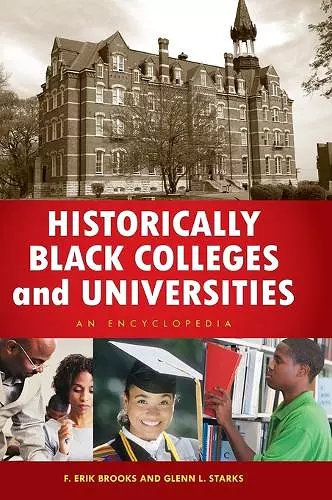Historically Black Colleges and Universities
An Encyclopedia
F Erik Brooks author Glenn L Starks author
Format:Hardback
Publisher:Bloomsbury Publishing PLC
Published:13th Sep '11
Currently unavailable, our supplier has not provided us a restock date

This exhaustive analysis of Historically Black Colleges and Universities (HBCUs) throughout history discusses the institutions and the major events, individuals, and organizations that have contributed to their existence.
The oldest HBCU, Cheyney University of Pennsylvania, was founded in 1837 by Quaker philanthropist Richard Humphreys as the Institute for Colored Youth. By 1902, at least 85 such schools had been established and, in subsequent years, the total grew to 105. Today approximately 16 percent of America's black college students are enrolled in HBCUs. Historically Black Colleges and Universities: An Encyclopedia brings the stories of these schools together in a comprehensive volume that explores the origin and history of each Historically Black College and University in the United States.
Major founders and contributors to HBCUs, including whites, free blacks, churches, and states, are discussed and distinguished alumni are profiled. Specific examples of the impact of HBCUs and their alumni on American culture and the social and political history of the United States are also examined. In addition to looking at the HBCUs themselves, the book analyzes historical events and legislation of the past 174 years that impacted the founding, funding, and growth of these history-making schools.
This is an excellent primary source for undergraduates to use in beginning research. . . . Summing Up: Highly recommended. * Choice *
Historically Black Colleges and Universities: An Encyclopedia is a book for everyone and makes an invaluable contribution to literature that examines HBCUs. In a time of budgetary crises in higher education, this book is necessary, particularly for policymakers and the general public to better understand the need for support of such schools. Furthermore, this book serves scholars well as a current, comprehensive publication of the study of HBCUs.
Scholars, joumalists, and policymakers (Kimbrough, 2011) have raised the question: Why do we still need HBCUs? This comprehensive and thoughtful encyclopedia answers the question well. HBCUs are not only necessary but also valuable in shaping the narrative of African American history in the way that previous landmark decisions and events have done.
ISBN: 9780313394157
Dimensions: unknown
Weight: 907g
388 pages